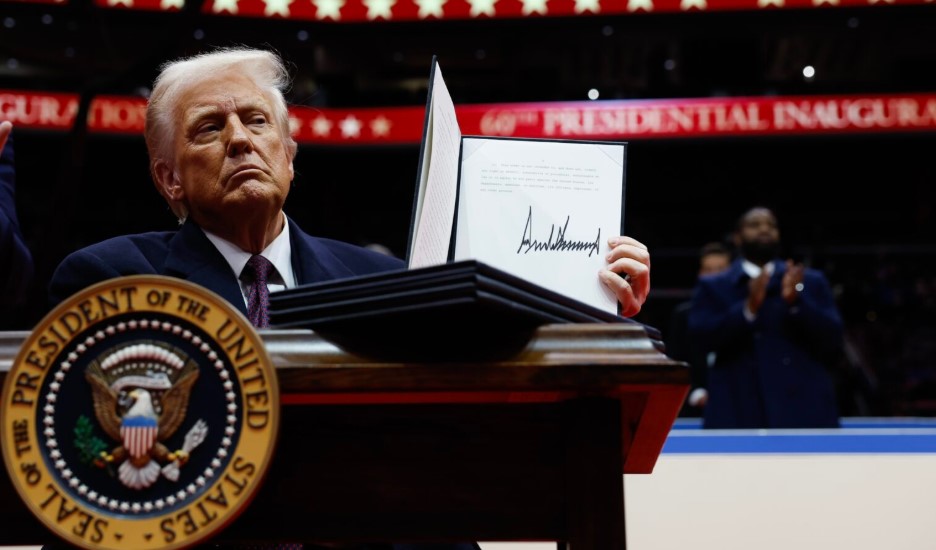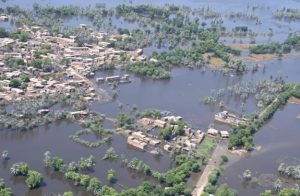
This planet, shaped into a masterpiece by human effort over millennia, now faces an existential threat. Can this creation withstand such greed? Every person on this Earth must ponder this.

By Abdul Razak Khatti, Islamabad, Pakistan
When Donald Trump signed the executive order to withdraw from the Paris Agreement after his presidential oath, over 12,500 homes in Los Angeles had already burned to the ground. These magnificent homes, which seemed like dreams just days before, had turned to ash. It was a heap of rubble weighing millions of tons, resembling a war zone. The owners of these homes were left with only what they could carry while fleeing to save their lives. Damages had exceeded $275 billion, yet the fires remained uncontrollable. Although strong winds were the primary cause of the fire’s spread, the reasons behind those winds are still under investigation. However, American scientists unanimously agree that climate change was a significant factor behind the Los Angeles fires.
Trump, however, was adamant. He never accepted the global consensus on climate change. Behind his stance was the backing of billionaire corporate alliances. During his election campaign, he repeatedly vowed to withdraw from the Paris Agreement to make the U.S. energy self-sufficient. Without exiting the Paris Agreement, he couldn’t favor the fossil fuel industry. The slogan “Drill Baby Drill” reflected this philosophy: drill more oil wells to make America energy-independent and reward the billionaires of the fossil fuel industry.
For a business tycoon like Trump, it didn’t matter if Los Angeles burned in 2025 or if millions of people in Sindh were displaced by floods in 2022. On January 7, when the fires began, Los Angeles County was suffering from severe drought—the worst heatwave in 130 years. From May 2024 onward, the region had received only 4.1 millimeters of rain. Southern California is currently enduring one of its most intense droughts, affecting 2.2 million people.
The U.S. is one of the world’s largest contributors to carbon emissions. Trump’s withdrawal from the Paris Agreement dealt a significant blow to the global fight against climate change. Few people worldwide are aware that American billionaires fund organizations with millions of dollars to cast doubt on campaigns against fossil fuels and greenhouse gas emissions, weakening the global effort to combat climate change. Trump is the best political choice for these fossil fuel billionaires.
A report published by The Washington Post in May 2024 revealed that Trump appealed to the fossil fuel industry for $1 billion in donations during his campaign, promising to roll back environmental regulations and climate policies as soon as he took office. The Climate Accountability Research Project found that Trump’s policies encouraged fossil fuel billionaires to grow their wealth, paving the way for his rise to power. Between April 2024 and January 2025, the combined wealth of 15 billionaires associated with the fossil fuel industry swelled by $42.62 billion, growing from $267.6 billion to $310.2 billion. These billionaires’ control over policy decisions continues to exacerbate climate change’s devastating effects.
A recent analysis by the Institute for Policy Studies highlighted how tax laws in the U.S. allow wealthy donors to fund misinformation campaigns while evading taxes. Reports reveal that $219 million was given to charitable organizations promoting climate change denial between 2020 and 2022. Notable recipients include the Stand Together Network, which received $873 million in donations, and the Competitive Enterprise Institute, which received $21 million and actively lobbied for Trump’s withdrawal from the Paris Agreement. The Heritage Foundation, another major recipient, received $236 million during the same period to undermine global climate action.
American media outlets have reported extensively on the human and economic toll of climate change within the U.S. The fires in Los Angeles, fueled by unprecedented drought and heat, are part of a larger trend of extreme weather events exacerbated by global warming. According to NASA’s 2024 Climate Impact Report, the average global temperature has risen by 1.2°C since pre-industrial levels, contributing to increased wildfires, rising sea levels, and intensified storms.
The Paris Agreement, signed by 195 countries, aims to limit global temperature rise to 1.5°C–2°C above pre-industrial levels. Trump’s decision to withdraw from this accord was widely criticized. Despite the U.S. being one of the world’s largest carbon emitters, Trump prioritized short-term economic gains for fossil fuel industries over the long-term survival of the planet. His withdrawal from the agreement had severe implications for vulnerable nations like Pakistan.
Pakistan faced one of its worst climate-induced disasters in 2022. From June to October, catastrophic floods caused by unprecedented rainfall and glacial melt claimed 1,739 lives and displaced over 33 million people. The economic damage exceeded $40 billion, crippling the country’s already fragile economy. These floods are a stark reminder of the disproportionate impact of climate change on developing nations, which contribute little to global emissions but bear the brunt of its consequences.
When Joe Biden assumed office, he reversed Trump’s decision and rejoined the Paris Agreement. His administration prioritized clean energy investments, allocating billions of dollars to develop electric vehicles, battery technologies, and renewable energy infrastructure. The Inflation Reduction Act of 2022 provided significant incentives for clean energy production, particularly in Republican-dominated districts. Analysts argue that reversing these policies under Trump’s potential second term could derail global progress toward climate goals.
A 2024 analysis by the Rhodium Group warned that rolling back clean energy policies would increase U.S. greenhouse gas emissions by 24–36% by 2035, raising household energy costs by an estimated $489 annually. Such policies would harm the environment and place the U.S. at a strategic disadvantage as China emerges as a global leader in renewable energy technology.
The fight against climate change requires collective global action. The greed of a few fossil fuel billionaires threatens the future of billions. Their wealth, often accumulated at the planet’s expense, fuels misinformation campaigns that undermine scientific consensus and delay meaningful action. Addressing this inequality is crucial to mitigating climate change and ensuring a sustainable future for all.
Governments, corporations, and individuals must take responsibility as the world faces increasingly dire consequences of climate change. The Paris Agreement is not just a treaty; it is humanity’s last line of defense against a rapidly warming world. The time to act is now before the flames of inaction consume us all.
This planet, shaped into a masterpiece by human effort over millennia, now faces an existential threat. Can this creation withstand such greed? Every person on this Earth must ponder this.
About the Author

Abdul Razak Khatti is a senior journalist, political analyst, and environmentalist. He has covered parliamentary reporting for various national media outlets and is keenly aware of Pakistan’s political affairs and environmental challenges.:razak.khatti@gmail.com





Nice share!
Thanks for appreciation